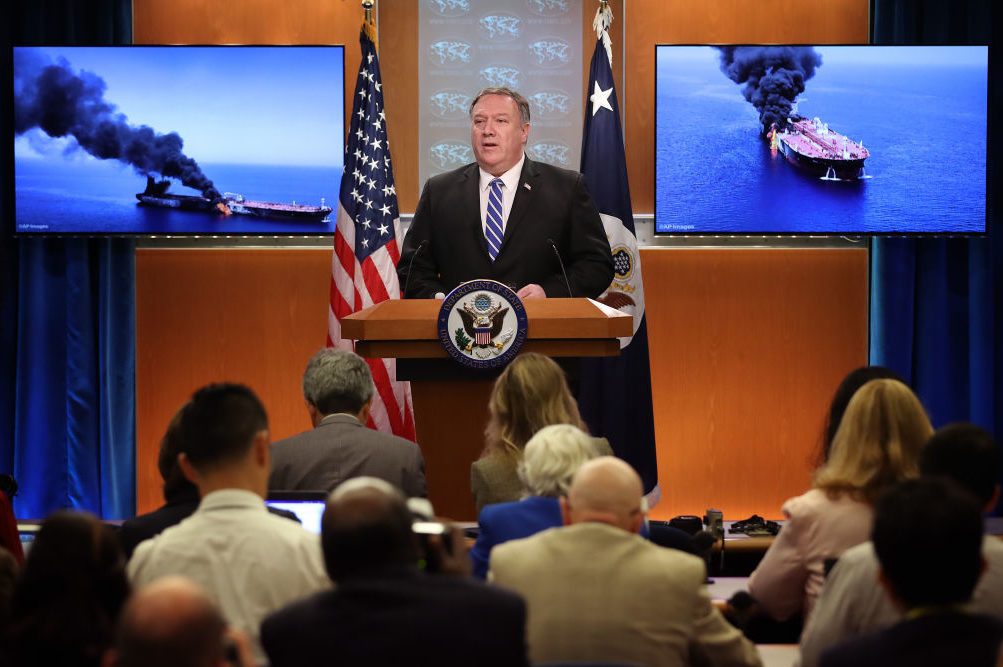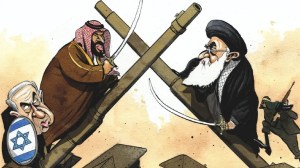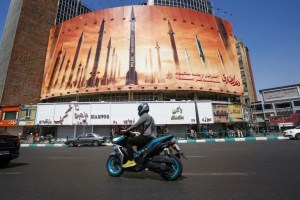The Trump administration’s Iran policy is regime change in all but name. Rudy Giuliani, the president’s former attorney, once told me that while the administration emphasizes ‘change in behavior’, the Islamic Republic is so flawed that its regime is probably beyond reform.
On this week’s Washington Shots podcast, pundit Tom Rogan told me that the list of demands Mike Pompeo laid out last year is so compendious as to demand the collapse of the Islamic Republic. Rogan, an Iran hawk, thinks the secretary of state has gone too far. So too does Trump — or so he did until the Thursday’s flare-up, the apparent Iranian bombing of an oil tanker in the Gulf of Oman. After weeks of drawdown — a Pompeo pledge to negotiate with the Mullahs without preconditions, a timeout of sorts for hawkish national security adviser John Bolton — sword-waving toward Tehran is back, and back big.
‘Iran did do it,’ Trump told Fox & Friends on Friday, adding that his administration is ‘going to see how to stop’ the regime from similar actions.
Hawks in the administration’s orbit, such as the Foundation for the Defense of Democracies and the People’s Mujahideen of Iran (MEK), will no doubt be salivating at a chance to resuscitate the primaveral zeitgeist —the moment last spring when the Trump administration designated Iran’s elite military force the Islamic Revolutionary Guard Corps a terrorist organization. The hawks hoped that the designation would be the coup de grâce in a two-year march to isolate the Islamic Republic from the global community. Next week, the MEK’s proxy in Washington, the National Council for the Resistance of Iran (NCRI), will rally near the White House.
Trump may now resume his previous hard line, but it’ll be messy. His administration is chock full of regime-changers, but the president, as he repeatedly insists, is no fan of regime change. ‘I’m not looking to hurt the country but they can’t have a nuclear weapon. It’s that simple,’ Trump told Fox & Friends on Friday. The moderate contradiction between what Trump says and what many senior aides emphasize could not be clearer.
Clearer still is that Trump does not like to look a fool. Iranian aggression infuriates the commander-in-chief: further threats toward the US would be the ‘end of Iran’, he said last month. This sensitivity provides an opening for Trump’s more entrepreneurial aides, notably Ambassador Bolton. In 2017, Bolton, then a civilian, wrote in National Review on his idea of preparations for policy after the end of JCPOA (the ‘Iran Deal’): ‘With Israel and selected others, we will discuss military options.’
But if the hawks are indeed back in the saddle, it won’t all be easy riding. For a start, the public and media, burnt by the intelligence failures of the Iraq War, no longer trust statements from the intelligence agencies — or video from Central Command, for that matter. Already, questions about the veracity of Pompeo’s claims could smother the case for further action.
The Associated Press said Thursday that the owner of one tanker contradicted American statements that the damage to his ship was caused by mines. The owner says he saw flying objects; missiles, presumably. Who really knows? ‘Tankers are attacked in Mideast and US says video shows Iran was involved,’ the New York Times headlined its report, showing a caution that would have come in useful in 2003. The Times added coldly that Pompeo ‘provided no evidence’ for his claim. On Thursday night, the Times even ran an op-ed asking if the US government had faked the video: ‘Are the Oman tanker attacks another Gulf of Tonkin?’
Crucially, this is not Syria, where US intelligence has repeatedly confirmed that Bashar al-Assad gassed his own people. On Syria, the US assessed; the US acted. The US’s Syria analysis may actually be unraveling at present in the media, but questioning that intelligence remains, for the US establishment at least, the ‘realm of conspiracy theory’ as New Yorker writer Dexter Filkins aptly put it.
Though Syria may be a proxy fight in the Iran standoff, Iran itself is different. In 2018, Trump nullified a popular deal inked by a popular president. He may have been right to do so, but his action cast further doubt on an administration already ruinously distrusted by elites. This is not 2003, when George Bush led America into Iraq. Nor is it 1998, when Bush’s predecessor Bill Clinton marshaled a bipartisan spirit for airstrikes on Saddam. Further, Trump’s own attacks on US intelligence agencies and a government ‘deep state’ undermine public faith in the government’s trustworthiness.
Military retaliation would be a heavy lift. If Trump raises the tempo of the war drums on Iran, he’ll be going it alone. The president who won the White House by eviscerating US errors in Iraq should reject a distressingly similar conflict with Iran.


















